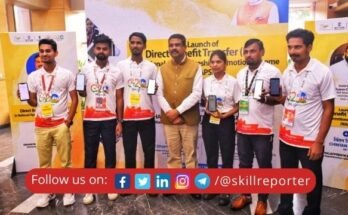Chennai : Cooridnated by National Skill Development Council (NSDC), Confederation of Indian Industries (CII) and Deutsche Gesellschaft fur Internationale Zusammenarbeit (GIZ), the Skill Connect Road Show event in Chennai was witnessed by industry and sector skill councils, training partners and other, who participated in the dialogue on implementing the Apprenticeship Training in the industry.
The workshop was attended by Mr Manish Kumar, CEO, NSDC; Ms B Jothi Nirmalasamy, COmmissioner, Commissionerate of Employment and Training and MD, Tamil Nadu Skill Development Corporation; Mr B C Datta, Vice president, Corporate Affairs, Hyundai Motor India Ltd., Tamil Nadu and Mr C Chandrasekhar, RDAT, Chennai.
Mr Surajit Roy, Director, Apprenticeship, NSDC, explained the reforms under the Apprenticeship Act that have incorporated all the demands of the industry to make apprenticeship regime user-friendly and shared the new operational framework for Apprenticeship in India. He invite the companies from both manufacturing and service sector to participate in this new apprenticeship training and benefit from the same. To showcase the user-friendly interface, NSDC conducted a live tour of the Apprenticeship Training Portal.
Mr B V Datta, referring to the importance of skill development in driving the nation’s economy, affirmed the Apprenticeship Training as a major step towards skilling of youth in India.
Mr Manish Kumar highlighted the importance of skill development in India in the contemporary context. Explaining the significance of the debates and discourse at the State level in policy formulation, he promised to encourage the dialogue at the State level by means of advanced technology and healthy discussions. By skilling the youth, there is a notable increase in their productivity, the returns of which can be collectively availed by the industries and the nation at large, he explained.
Ms B Jothi Nirmalasamy, acknowledging the participation of industries in skill development initiatives, informed that Tamil Nadu is amongst the leading states in skill development in India. She appealed the industries to identify new job roles, develop new courses and bring to the notice of the State Government for inclusion under SCVT. She encouraged the industries to partner with the Government in skilling the youth and moving towards “Skill India” mission.
Mr C Chandrasekhar welcomed the concept of accessibility and dialogue and urged the industry members to bring the issues faced by them to his notice for quick redressal.
CII presented its 360-degree assistance in the Indian industrial ecosystem and offered to support the industries through handholding, providing a help desk and addressing both the demand and supply side with respect to the Apprentices by systematic identification through Model Career Centre.
GIZ presented the Indo-German Programme for Vocational Education and Training and the experiences made by the project in creating a systematic change by encouraging industry associations to become ‘professional skill development service provider’ for its member companies. The experiences from Bhiwadi and Aurangabad were shared in detail so as to create an understanding on how the industry or cluster associations can apply elements from the new Apprenticeship operational framework to steer the skill development services.
By means of interactive session, the participants were invited to deliberate on the inputs provided by NSDC, CII and GIZ; and in the context, present the opportunities and areas of improvement for a speedy review; the support that should be extended by each of the organisations as well as their participation in apprenticeship training (the job roles they expect would be required by their companies, and the corresponding number of apprentices).
Suggestions from participants to undertake more number of practical training programmes and soft skills courses in the curriculum were welcomed by the authorities. Several clusters where Apprenticeship Programmes can be offered were identified and discussed. Issues raised by the industry with respect to the Apprenticeship Programme were addressed, and their concerns noted.
The workshop ended on a positive note with expectations of enhanced engagement by all the stakeholders in promoting the Apprenticeship Programme. Several companies identified job roles and stepped forward towards engaging apprentices in their organizations.



